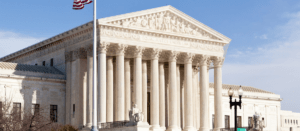Three choices were reported to be at the top of President Joe Biden’s list of possible Supreme Court nominees. Judge Michelle Childs appeared to have more broad support, even among some Republicans. But the radical left demanded Judge Ketanji Brown Jackson. Predictably, they got their wish.
The radical group, Demand Justice, who shamefully had trucks around Washington, D.C., asking Justice Stephen Breyer to retire, along with other radical groups like MoveOn and Indivisible, had called for Judge Brown in no uncertain terms. The move prompted Sen. Lindsay Graham (R-South Carolina) to say, “The radical Left has won President Biden over yet again.”
So, who is Judge Ketanji Brown Jackson? Here is a basic rundown.
She was born in Washington, D.C., on September 14, 1970. She is 51. Last year, she became a judge for the United States Court of Appeals for the District of Columbia Circuit, taking the seat left vacant by U.S. Attorney General Merrick Garland. Even then, she had strong Republican opposition, being confirmed by a 53-44 vote. Only three Republican Senators, Susan Collins (Maine), Lisa Murkowski (Alaska), and Lindsey Graham (South Carolina), voted in favor.
Before that, she was a judge at the U.S. District Court in Washington, D.C., after being nominated by President Barack Obama and was the Vice Chair of the United States Sentencing Commission. She also clerked for Justice Breyer after graduating from Harvard Law School.
After her clerkship with Justice Breyer, Judge Jackson went to work for Goodwin Procter, a large law firm out of Boston, where she helped write an amicus (“friend of the court”) brief representing NARAL Pro-Choice America, the League of Women Voters, and the Abortion Access Project of Massachusetts, among others. The case was McGuire v. Reilly, a 2001 case where she supported a law targeting pro-life advocates trying to counsel women at abortion clinics.
Her pro-choice advocacy work has earned her the support of Big Abortion, including Planned Parenthood, NARAL, and the National Women’s Law Center. They are confident she will be willing to circumvent the Constitution to promote abortion “rights.”
The same can be said for the endorsements of pro-LGBTQ groups, like the Human Rights Campaign, who are pushing the boundaries of laws protecting women in sports, women’s shelters and prisons, and multiple other areas.
Her commitment to labor unions has also been held as an important asset, especially when comparing her to other nominees. She was cheered for her enjoining an executive order by President Trump that sought to hold federal employees accountable. She was later overruled unanimously by a D.C. Circuit panel that included an Obama appointee. But this seems to boost her credibility among activists looking for judges who will be “progressive” in their ruling, despite what may be required by the text of the law and judicial procedure.
There are concerns about her religious liberty commitments, also. At her D.C. Circuit hearing, Sen. Josh Hawley (R-Missouri) asked her about her involvement with a Christian school. Though she said she believed in religious liberty, she felt the need to distance herself from the Christian teachings relating to marriage that were referenced. This is an area that the Senate must fully explore.
The full review of her record is just starting, so we will have much more to come. But the preliminary report must be concerning for all freedom-loving Americans who want judges who will show the judicial restraint envisioned by the Constitution, instead of judges who interject themselves on every political and socially controversial issue with which “we the people” have vigorous disagreements to push their personal policy preferences.






